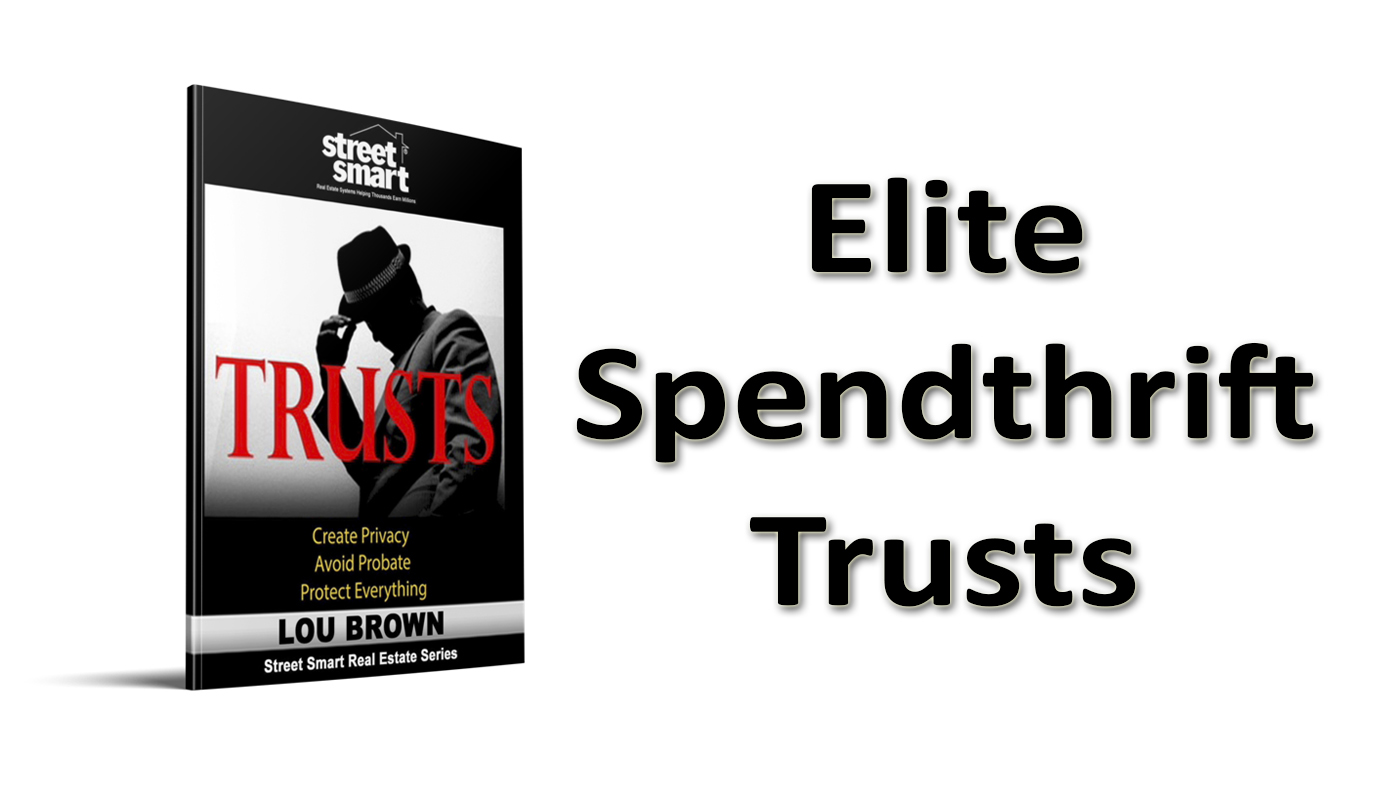 |
|
|
MAIN ADVANTAGES OF THE ELITE TRUST Every aspect of our Elite Trust has been fully vetted by our law firm who has created over 30,000 trusts over a 20 year time span, with no client IRS audits from any of our tax preparers' returns. Our Trust is guaranteed by the U.S. Constitution, Supreme Court and other court decisions. * It is easy to establish, can be maintained by you and involves minimal paperwork. It greatly reduces or eliminates fees. * It can be used to defer taxes in perpetuity. * It is lawful in every state. A Spendthrift Trust properly established in one state can operate in any other state. * It is made irrevocable to avoid any questions as to ownership of the assets (however it is modifiable should changes wish to be made, i.e. Trustee and or Beneficiaries). * It prevents any information about your assets, liabilities and heirs from becoming public. * It can operate any lawful business anywhere in the world. It has significantly less liability than an C Corporation, an S Corporation or a LLC and most of the advantages of a corporation with none of the disadvantages. * It has no periodic reports, registration or accounting to make to any state. * It has the same constitutional rights as any individual, that is, the right to privacy, freedom from unwarranted search and seizure, to refrain from self-incrimination and all other rights. * All of the assets and cash that are moved into a trust, through the endowment of the corpus, is totally tax deferred. * When the Elite Spendthrift Trust is used in a legal manner and under the provisions of the Spendthrift, it is totally impenetrable by creditors, agencies, governments and is immune from transfer by operation of law. * A personal bankruptcy has no effect on the Spendthrift Trust assets. IMPORTANT FACTS OF OUR ELITE TRUST * The uniqueness of this Trust stems not from any variant legal doctrine, but from the unique manner in which the Trust and correlating documents intertwine provisions that have existed for many decades in less creative iterations. * The verbiage of the Trust and the accompanying documents work together as a system to accomplish the purpose for which the Trust was created. * The Elite Trust provides multiple opportunities regarding tax benefits. This is not a tax dodge, it is tax deferment through the life of the trust. The Trust defers taxes until the Beneficiary receives their disbursement; if, when and ever. However, this does not mean that the trust can make payments, i.e. distributions for virtually any reason. * The IRS law says there has to be a possibility for an end of the Trust for there to be a possibility of tax. The Elite Trust is set up for 21-year renewable option (this can be done in perpetuity). If the Trustee decided to end the Trust, he or she could and would pay the tax on the entire value of the Trust. |
|
|
|
|
Click Here to schedule a 1 on 1 Consultation LEGALITY OF THE ELITE TRUST * Only licensed Attorneys are permitted to give legal advice, create and sell legal documents and practice law. * The Elite Trust copyright is distributed by Street Smart through the Law Firm we work with. * The Elite Trust estate management tool was designed to be supremely legal, tax friendly and compliant within the Internal Revenue Code so that the Trust cannot be investigated or have the ability to be overturned for any reason. * Since the inception of the Elite Trust, not one has ever been audited, challenged or overturned. * Included in the price of your Elite Trust, you will be provided with all 44 required legal documents to perform necessary Trust business. * Purchasing a Trust from representatives outside the legal profession can mean you have bought an invalid document, and purchasing a copyright from those who are not authorized to distribute it is illegal. Non-Grantor, Irrevocable, Complex, Discretionary, Spendthrift Trusts provide the utmost legal protection and tax advantages for all our clients 1. Our Trusts were written to comply with Scott on Trust Law, the Restatement of Trusts and the Internal Revenue Code. This was done so the Trust Corpus would be protected from turnover orders by any court or judge, with the exception of fraudulent conveyance. 2. The non-grantor designation exempts the Trust from any alter ego status that brings into action the management or beneficial enjoyment by the Settlor. If the creator of a trust has management of the corpus, or is a beneficiary of the trust, it becomes a so called living trust which has limited benefits and no tax advantages or asset protection. 3. In order to have asset protection, the Trust must be Irrevocable and non-grantor. This Trust separates the Settlor or Creator from the corpus of the Trust. When assets are irrevocably transferred to Trust they may never revert to the one who is making the endowment or the Settlor of the Trust. Under these terms and conditions, upon creation, legal separation has occurred and the corpus may not be breached by claimants of the Settlor. 4. In order to serve the Beneficiaries of the Trust and protect the corpus, the Trust must be Complex in nature with terms and conditions that plainly and fully state the powers and limitations of the Trustees. Complex Trusts are governed by terms and conditions that may not be altered or changed by the Trustees and the purpose of the Trust is established once and for all time. 5. The Spendthrift Provisions of the Elite Trust are the critical element of the document in that no Spendthrift Trust Corpus may be penetrated to reach the assets of that Corpus. Case law upholds this and has upheld this over the many long years of its existence and will continue to uphold it. No judge or court may issue a turnover orders against a properly constructed Spendthrift Trust. The sole exception to this rule of law is fraudulent conveyance to avoid judgment; and this applies to a Trust created after litigation has been filed, not before. 6. The Discretionary terms and conditions of the Trust are established to insure the absolute and sole discretion power of the Trustee in determining the distribution of the Corpus assets to the Beneficiaries of the Trust. If any single percent of the Corpus is designated to be held, or distributed, to any one or more Beneficiaries, the Discretionary designation of the Trust would be invalid. This in no way would affect the asset protection but, could adversely affect the taxable structure of the Trust. The Internal Revenue Code is explicit and clear with regard to the discretionary nature of a Trust plainly stating that if a fiduciary has the sole and absolute authority to designate something as Extraordinary Dividends or Taxable Stock Dividends, and that is paid to the Corpus of the Trust, and not subject to distribution, this is not income to the Trust according to IRS Rule 643. Thus, all of our Elite Trusts are created and are written to be Non-Grantor, Irrevocable, Complex, Discretionary, Spendthrift Trusts and Copyrighted for our use. The attorney firm, is the sole owner of Copyrights, and LLC that sells the Copyrights under license so that it is legal to offer the documents under his law license. |
|
|
TRUST INCOME AND TAX LAW Internal Revenue TITLE 26, Subtitle A, CHAPTER 1, Subchapter J, PART I, Subpart A, Sec 643 (a)(3),(4),(7) and (b) states: (3) Capital gains and losses. Gains from the sale or exchange of capital assets shall be excluded to the extent that such gains are allocated to corpus and are not (A) paid, credited, or required to be distributed to any beneficiary during the taxable year, or (B) paid, permanently set aside, or to be used for the purposes specified in section 642(c). Losses from the sale or exchange of capital assets shall be excluded, except to the extent such losses are taken into account in determining the amount of gains from the sale or exchange of capital assets which are paid, credited, or required to be distributed to any beneficiary during the taxable year. The exclusion under section 1202 shall not be taken into account. (4) Extraordinary dividends and taxable stock dividends For purposes only of subpart B (relating to trusts which distribute current income only), there shall be excluded those items of gross income constituting extraordinary dividends or taxable stock dividends which the fiduciary, acting in good faith, does not pay or credit to any beneficiary by reason of his determination that such dividends are allocable to corpus under the terms of the governing instrument and applicable local law. (7) Abusive transactions The Secretary shall prescribe such regulations as may be necessary or appropriate to carry out the purposes of this part, including regulations to prevent avoidance of such purposes. If the estate or trust is allowed a deduction under section 642(c), the amount of the modifications specified in paragraphs (5) and (6) shall be reduced to the extent that the amount of income which is paid, permanently set aside, or to be used for the purposes specified in section 642(c) is deemed to consist of items specified in those paragraphs. For this purpose, such amount shall (in the absence of specific provisions in the governing instrument) be deemed to consist of the same proportion of each class of items of income of the estate or trust as the total of each class bears to the total of all classes. (b) Income for purposes of this subpart and subparts B, C, and D, the term "income", when not preceded by the words "taxable", "distributable net", "undistributed net", or "gross", means the amount of income of the estate or trust for the taxable year determined under the terms of the governing instrument and applicable local law. Items of gross income constituting extraordinary dividends or taxable stock dividends which the fiduciary, acting in good faith, determines to be allocable to corpus under the terms of the governing instrument and applicable local law shall not be considered income. |
|
|
Who can benefit from a Spendthrift Trust? Anyone who wants:
|
|
|
Click Here to schedule a 1 on 1 Consultation Frequently Asked Questions
Q
Has our Trust ever been challenged by the government
and was it successful? Q If I take $5 million of Trust assets and invest in apartment houses, is the rental income considered taxable income? No Q If I invest $1 million of Trust assets in Euros and turn a profit of 10% is that taxable income for the Trust? No Q Is this particular Trust free from Probate and Estate Taxes? Yes Q Is a Trust owned Property or an Automobile paid with Trust funds through a Trust bank account taxable once it leaves the Trust bank account? No... but sales tax is paid on the purchase Q Are Trust to Trust fund transfers of assets taxable? No Q Can this Trust be legally used in all 50 states and overseas countries? Yes Q What is the life of the Trust and who is responsible to renew it before it expires? 21 years and is renewed by the Trustee Q When purchasing Home or Auto Insurance for assets in Trust, who is on the Title and does the Trust pay all premiums? Title to the Trust and the Trust pays the insurance premiums Q Can the Trust operate a business in it s name or is it required to utilize a LLC when doing so? Yes... but it is not required Q Can a beneficiary whose children are grown and grandchildren eligible to travel with expenses paid by the Trust when traveling on Trust business? Yes Q Are there any potential issues with a Trustee or Compliance Overseer residing in a Trust owned property full time? No Q Is it best for the Trustee or the Compliance Overseer to be paid a salary and the best frequency? Salaries are optional and can be paid but are taxable as income Q Is the Trustee and Compliance Overseer considered an employee or contracted by the trust? No Q Does a Beneficiary pay rent while living in a Trust property? No Q Is there a Min/Max salary range that a Trustee or Compliance Overseer is paid? No |
|
|
Click Here to schedule a 1 on 1 Consultation Click Here for a recorded webinar on these Trusts |
|
|
Copyright 2018- Trust Associates - All Rights Reserved |
 Joseph P. Kennedy s choice to
place his fortune in trusts is possibly the single most
critical reason why the family wealth is still around today.
The most obvious benefit was to protect the fortune from the
prying fingers of ne er-do-well heirs, said Laurence Leamer,
who wrote three Kennedy biographies. Trusts often prevent
beneficiaries from tapping more than 10 percent of
principal, said Rick Kruse, principal at Kruse and Crawford,
which offers estate management advice.
Joseph P. Kennedy s choice to
place his fortune in trusts is possibly the single most
critical reason why the family wealth is still around today.
The most obvious benefit was to protect the fortune from the
prying fingers of ne er-do-well heirs, said Laurence Leamer,
who wrote three Kennedy biographies. Trusts often prevent
beneficiaries from tapping more than 10 percent of
principal, said Rick Kruse, principal at Kruse and Crawford,
which offers estate management advice.